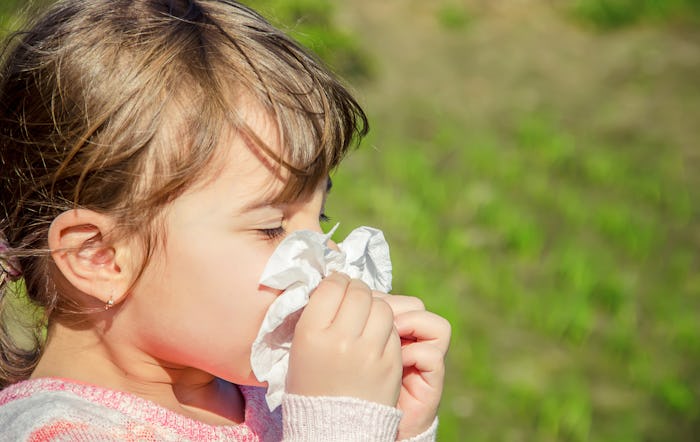Life
If Your Child Has Seasonal Allergies, You May Be Part Of The Reason Why
If you're one of the many stuffy-nosed, itchy-eyed people who spends every spring stumbling around in a daze from antihistamines, you're likely hoping that your kids are magically spared from suffering through the same pollen-induced misery. (Honestly, you probably wouldn't wish the experience on your worst enemy, let alone your own kids.) It would be nice if they could breathe well enough to smell the spring flowers, at least. But is there any real hope they won't end up like you, or are seasonal allergies hereditary for sure?
Unfortunately, just like you might have passed down your stature or your tendency to burn in the sun (or not), seasonal allergies can definitely be inherited, according to research cited by the National Institutes of Health — but, as with so many other conditions and traits, genes aren't the only influencing factor.
More on those other factors later, though. As for the genetic part of the equation, while science long ago confirmed that allergies are a hereditary condition, experts have been getting closer and closer to figuring out the specifics behind that genetic connection in recent years.
As TIME reported, a study published in the journal Science Translational Medicine found that one major genetic "glitch" could be responsible for most allergies and asthma (seasonal and otherwise). Researchers from Johns Hopkins Children's Center and the Johns Hopkins Institute of Genetic Medicine who were studying the genetics of Marfan and Loeys-Dietz syndromes (both rare tissue disorders) were apparently "surprised" to discover that the same mutation found in Marfan and Loeys-Dietz patients "may also trigger the immune changes responsible for allergies" (and that most of the patients with those disorders also have "higher than normal" rates of allergies).
How exactly does this mutation make your spring miserable? It all has to do with "abnormal signaling" by a protein called transforming growth factor-beta (TGF-beta), which regulates cell growth and communication.
“Disruption in TGF-beta signaling does not simply nudge immune cells to misbehave but appears to singlehandedly unlock the very chain reaction that eventually leads to allergic disease,” said cardiologist Dr. Harry Dietz, the study's senior author, in a statement.
Basically, TGF-beta is supposed to keep T-cell function in check. The patients in the study, however, had overactive T-cells that attacked everything: not just stuff they're supposed to attack, like pathogens, but harmless things like food proteins, too. It's a cycle that demonstrates how most allergies start, according to the researchers.
Gender can further influence genetically inherited allergies, according to a study published in the Journal of Allergy and Clinical Immunology which indicated a "sex-dependent association" of parent's allergic conditions with childhood allergies (maternal allergies increased the risk of allergies in girls; paternal allergies increased the risk in boys). This isn't to say that a person can't inherit allergic tendencies from a parent of the opposite sex, necessarily, just that the same sex connection increases the risk.
What else increases your child's risk of developing allergies? Getting back to those non-genetic factors, environment seems to play a huge role. One fairly terrifying study published in JAMA Pediatrics found that simply being born in the United States increases a kid's odds of having allergies. As TIME reported, when scientists compared "place of birth with allergic-disease prevalence," they discovered that children born outside of the U.S. were significantly less likely to develop allergies than those born in the U.S. (20 percent of foreign-born kids compared with 34 percent of the American-born children). Why? Experts aren't completely sure, though the "hygiene hypothesis" could be one explanation.
“The hygiene hypothesis suggests that early-life exposures to infection or an unclean environment may protect against allergies," said study author Dr. Jonathan Silverberg of St. Luke’s–Roosevelt Hospital Center in New York City. "Children born and raised outside the U.S. likely have more and/or different infectious exposures than those born in the U.S." he continued, adding:
“That American cities are ‘too clean’ may be overstated. However, previous studies suggest that rolling in the dirt from time to time may be a good thing for kids.”
So if allergies run in your family, does that mean you should be letting your kids roll around in the dirt more often? It probably can't hurt (unless your kid is allergic to grass, that is). Better ask your pediatrician first. And if your child did inherit her allergies from you, don't beat yourself up about it. After all, they were most likely passed down to you first!
Check out Romper's new video series, Bearing The Motherload, where disagreeing parents from different sides of an issue sit down with a mediator and talk about how to support (and not judge) each other’s parenting perspectives. New episodes air Mondays on Facebook.
